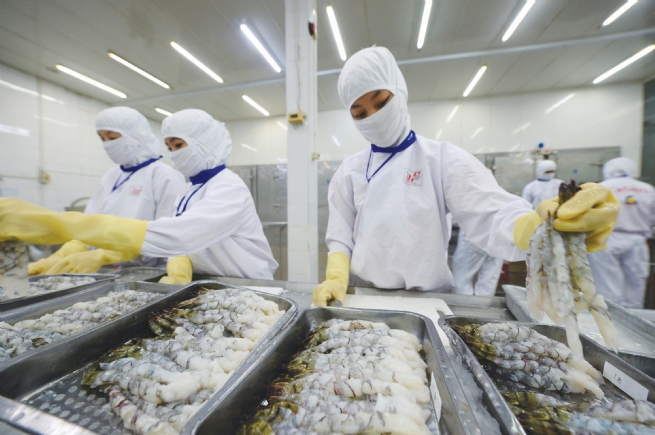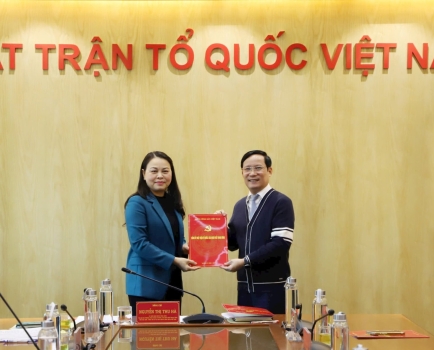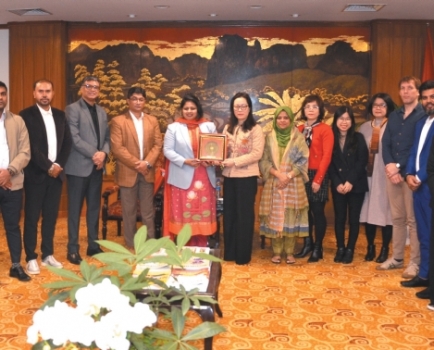Proactively Contributing to Making Good Policies to Improve Business Environment
Wed, 15 Sep 2021 14:04:00 | Print | Email Share:
Given that the fourth wave of the COVID-19 pandemic is developing complicatedly, many provinces and cities in Vietnam continue to apply restriction measures that negatively affect importing and exporting activity.
Exports decelerate
According to the Ministry of Industry and Trade, the August merchandise export value was estimated at US$26.2 billion, down 6% from the previous month. However, the eight-month value still rose 21.2% year on year to over US$212 billion.

All three key exports sank in August. Agricultural and aquatic products plunged 11.2% year on year to US$1.996 billion. Fuels and minerals were projected at US$231 million, down 33.2%. Manufactured goods dipped 3.3% to US$23.06 billion.
Rice suffered the steepest declines, down 14.8% in volume and 6.8% in value from the same period of last year. The COVID-19 pandemic greatly interrupted rice harvest and distribution in Mekong Delta provinces.
The export value of fuels and minerals plummeted 32.4% from July and 33.2% from the same month in 2020.
Exporters hit by countless difficulties
According to ministry, after a long time of social distancing, manufacturing was afflicted while transportation, forwarding and logistics were disrupted. Furthermore, workers’ return to their families to stay away from the pandemic also means likely personnel shortages after the pandemic is contained, especially for skilled workers such as mechanical and electronic workers.
A survey into 360 companies by the Vietnam Timber and Forest Products Association (Viforest) in mid-August showed that more than 50% of respondents halted production and faced the risk of bankruptcy because they still had to pay rents, taxes, fees and lending interest.
In order to keep up production and prevent pandemic contagion at the same time, expenses of member companies of the Handicraft and Wood Industry Association of Ho Chi Minh City (HAWA) rose by about 20-30%. Many found it difficult to endure and afford loan repayment.
Rice exporters were also entangled in difficulties. In addition to loss resulted from weakening export because of few orders, they also found it hard to access customers while spending more to prevent the COVID-19 pandemic. They could not meet export orders although stockpiled rice was abundant in stores. Hence, traders and merchants reduced their rice purchases from farmers. Without timely workable solutions, this link may lead to a disruption of rice export supply chain. The sharp drop in rice price, to a much lower level than a year ago, is an extra hit to rice traders.
Difficulty also hit the leather and footwear industry. Companies in this sector suffered enormous loss as they had to close or downscale production and had export orders canceled by partners while they still had to run factories and pay salaries for employees. The shortage of vacant containers, rising freight shipping costs (5-10 times higher than in 2020) plus higher prices of fuels and imported inputs severely hurt their production and troubled exporters.
According to the Vietnam Textile and Apparel Association (Vitas), the textile and garment export value contracted by 18.69% month on month in August. A lot of companies had to close or stop manufacturing, work in moderation, and failed to fulfill orders. In many cases, orders canceled by partners resulted in commercial loss for companies and disreputation of customers.
Vitas forecasts that the last four months of 2021 will be an extremely difficult time for the textile and garment industry and the 2021 target of US$39 billion will be hard to achieve. If the pandemic is not controlled in September 2021, the industry is likely to earn only US$33-34 billion from exports.
According to the Ministry of Industry and Trade, current solutions for businesses are reducing costs, preparing necessary things and labor force to resume production after the pandemic is contained, and making the most of incentives from FTAs (especially CPTPP and EVFTA). Companies particularly pay attention to COVID-19 prevention measures for industrial parks according to the guidance of the Government and localities.
Production, import and export growth in the coming time will depend greatly on how the COVID-19 pandemic is controlled and COVID-19 vaccination is deployed nationwide. Therefore, to prevent export decline from now until the end of the year, the Ministry of Industry and Trade has been focusing on solutions to strengthen and expand export markets, taking full advantage of FTAs already in force; and focusing on small and niche markets.
By: Huong Ly/Vietnam Business Forum
Source: https://vccinews.com/news/44847/exports-weaken-on-market-fluctuations-amid-covid-19-pandemic.html
---------------------------------------------
Same category News :













